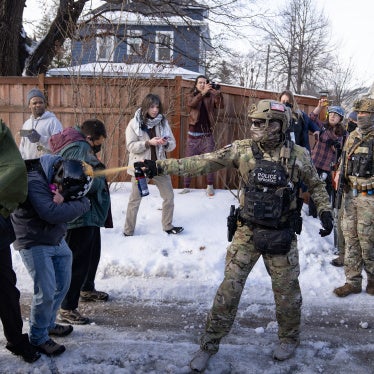The most important human rights institution in 50 years comes into being on Monday, but its future is far from assured. The US is doing everything it can to undermine the new International Criminal Court. Unless Europe acts decisively, the cause of international justice will be imperiled.
The US is doing everything it can to undermine the new International Criminal Court. Unless Europe acts decisively, the cause of international justice will be imperiled.
The current battleground is at the United Nations. The Bush administration is pressing to exempt UN peacekeepers from the reach of the court. By undermining the court's universality, the exemption would severely damage its credibility.
The move is the latest manifestation of the view in Washington that international justice is only for others, not for Americans. Yet behind this breathtaking arrogance, the US administration is trying to determine how far it can push its allies. It knows that the European Union has adopted a legally binding common position to defend the letter and spirit of the court's treaty. But it hopes that bluster and threats will force European governments to back down.
It is time to draw a line. If Europe forsakes this matter of principle, it will only embolden America's radical right in its belief that the US is above international law. Its demands will only intensify.
The ICC, a permanent tribunal with potentially global reach, is available to prosecute anyone who commits genocide, war crimes or crimes against humanity. Seventy-four governments, including the entire EU, have ratified its treaty.
The US has long feared that Americans might face frivolous or politically motivated prosecutions. In response, many safeguards were placed in the court's treaty. Furthermore, any government can prevent the court from taking a case by investigating and, if appropriate, prosecuting its own alleged war criminals. In short, the rules for a fair tribunal are in place. The task now is to ensure that they are conscientiously applied. That will depend on the quality of the judges and prosecutor, and the culture of the court. Europe will have a key role to play in ensuring that the court adheres to the highest standards of justice.
So might have the US. Even without ratifying the court's treaty, Washington could have offered advice on rules, personnel, procedures and prosecutions. But the Bush administration has chosen not to do so. And now, as the court is activated, it has upped the ante.
It is threatening to withdraw from UN peacekeeping unless the UN Security Council exempts all peacekeepers from the court's reach. The threat is less dire than it appears at first blush because US participation in UN peacekeeping is so small.
As of April 30, the US had only 35 troops and 677 police under the UN flag. Even if Washington were to withhold America's 27 per cent contribution to the peacekeeping budget, Europe would be better off making up the funds than sacrificing the promise of international justice. Washington's share of the budget for the UN mission in Bosnia, for example, comes to only €38m (£24.6m).
Washington would be very short-sighted to continue to undermine peacekeeping in Bosnia or elsewhere when it depends on peacekeeping help in Afghanistan. Its bluff can be called.
Washington says it would never deploy US troops where they would be subject to an international tribunal. But for the past seven years, US troops in Bosnia and Kosovo have been subject to the jurisdiction of the Yugoslav war crimes tribunal. So were US bombers over Bosnia in 1995 and Serbia and Kosovo in 1999. The crisis over the International Criminal Court is a manufactured one.
The administration also accuses European governments of hypocrisy because in Afghanistan they entered into a standard peacekeeping agreement governing troops charged with criminal activity. The agreement requires Afghanistan to send these troops back to their home country for prosecution, not to an international tribunal. But that requirement is consistent with the ICC's preference for national prosecution. It does not negate the court's power to scrutinise domestic prosecutions and to seize control if they are a sham.
The real reason behind Washington's blackmail is the most troubling. An increasingly influential faction in the Bush administration believes that US military and economic power is so dominant that the US is no longer served by international law.
Better to negotiate issues case-by-case from a position of strength, they contend, than to be bound by international law in ways that might prove inconvenient. This attitude can be seen in the US rejection of not only the ICC but also treaties ranging from climate control to small arms.
No effective global system can rest solely on coercion. Global order depends on most governments abiding voluntarily by shared norms. Exempting America from the rule of law undermines those norms, leaving a more violent and inhumane world. Europe must stand up to this superpower folly.








